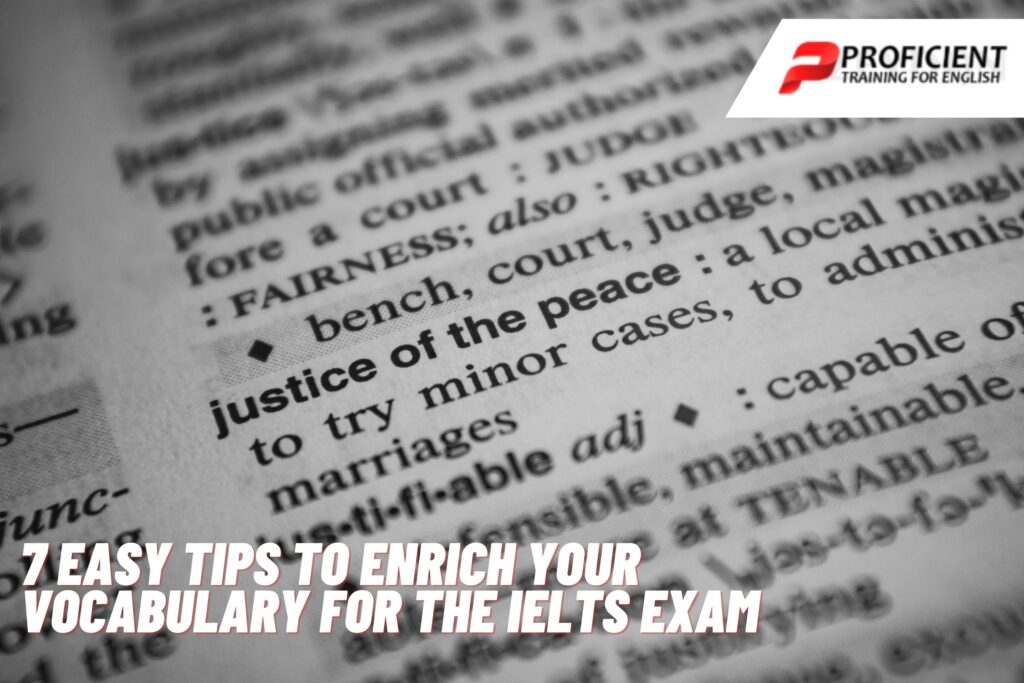There is no exclusive “vocabulary test” in IELTS test but despite that, IELTS vocabulary has a 25% of share in the marking criterion for every section.
Not only a rich vocabulary catches the examiner’s eye but also influences your IELTS speaking skills too. A vast vocabulary helps candidates communicate better, elaborately and smoother.
Here are the 7 super cool go-to tips to upgrade your IELTS vocabulary.
1. HAVE AN IELTS VOCABULARY-FRIENDLY APP
Sensing the growing popularity of IELTS vocabulary, plenty of free apps are at your service to improve your vocab.
These vocabulary-building apps introduce you to difficult, less popular and new words and how they are used as well as pronounced. Some of these apps are a word a day widget, word to word, and 7 little words.
2. SCRIBBLE ON YOUR BOOKS
For IELTS, reading books is highly recommended. It doesn’t matter what genre you read. As long as it is insightful for improving IELTS vocabulary, we suggest you give it a go.
Whenever you come across a word you don’t understand, google it immediately, understand its meaning, and scribble it on the page if necessary. If you reread the book and don’t remember the meaning of some word, you won’t have to google it again since you scribbled its meaning close by. Additionally, writing something down triggers senses that enhance memory of that word.
3. DON’T LET A WORD GO WITHOUT UNDERSTANDING IT
It’s very common for us to come across a word that we don’t quite fathom but we move along the book or article anyways. Well, it’s time to give this habit a break!
No matter how tiresome, always look up for the meaning of the word you don’t understand. You may not permanently remember it, but the next time you encounter it, you will at least not be foreign to it.
4. MAKE A NOTEBOOK FOR IELTS VOCABULARY
It always comes back to good ole pen and paper, doesn’t it?
Keep a handy notebook and pen that you can easily access whenever you learn a new word. Write both meaning and use of that word in a sentence for precise understanding and revision purposes.
5. GET HELP FROM YOUTUBE CHANNELS
There are several YouTube channels dedicated to IELTS coaching. IELTS has itself backed IDP IELTS official YouTube channel which makes short but informative videos.
Apart from the official channel, ILETS Liz, BBC learning English, IELTS coaching, BDS Eucomp, Manjita Osta are some of the channels good for strengthening IELTS vocabulary.
Nonetheless, YouTube is an endless platform. You are a click away from finding the perfect channel for you.
6. UNDERSTAND MORE, MEMORIZE LESS
Mugging up words is the last thing you want to do while empowering your vocab. Not only does mugging up work for a short period but it can also create confusion when the same word has an altered meaning in a different context.
For example,
The word “fair” has three meanings in different contexts. Let’s see them one by one with examples:
- The biggest colourful fair happens every two years. (Here, fair is a noun meaning a big event that is usually arranged for a celebration)
- Your decision by no means was fair. (Here, fair is an adjective meaning agreeable)
- Her fair skin glistened with the trickling bead of sweat. (In this example, fair means someone who has light skin)
With that in mind, don’t assume every word has a single meaning. Understand the meaning however, do not mug it up thoughtlessly.
7. LISTEN AND WATCH
This is probably the first way through which you first came across the English language. As a matter of fact, we learnt our mother tongue solely by listening, watching and reading.
These are a good source of applied vocabulary.
Learning new words from apps and dictionaries is less effective than actually watching characters using new words in their conversations.
You can start listening to English podcasts, watch English series or documentaries (that resonate with you) and look up the words that you don’t understand. This is purely passive learning where you both enjoy and learn at the same time. For the same reason, it’s also referred to as the most effective way to learn English or any language for that matter.
Apart from strengthening vocabulary, hearing and watching can help big time for the IELTS listening section too.
Upgrading your vocabulary and being perfect in it invests a major piece of your preparation time. Our experts at PTE, have developed courses where MOST of the hard work has been done, so that you can get on with the learning. These specially designed courses give you daily practice of essential vocab with Reading, Writing, Listening and Speaking practice, worksheets, tests, and e-study material. Start your preparation with us!
